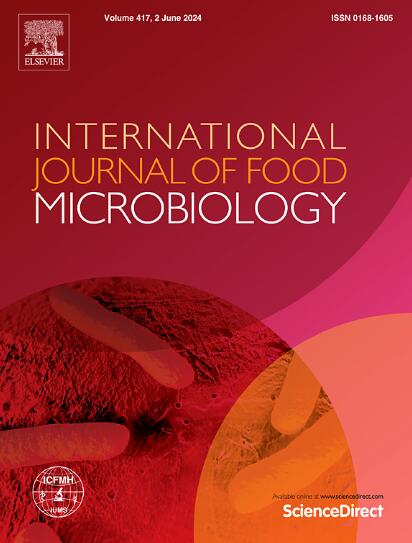Thermal-activated Polydopamine bilayer film exhibits dual-mode synergistic antibacterial properties for enhanced salmon preservation
IF 5
1区 农林科学
Q1 FOOD SCIENCE & TECHNOLOGY
International journal of food microbiology
Pub Date : 2025-05-21
DOI:10.1016/j.ijfoodmicro.2025.111279
引用次数: 0
Abstract
Foodborne pathogens threaten food safety and human health, prompting the need for innovative preservation solutions. Polydopamine endowed with photothermal properties represents a novel material for the inhibition of foodborne pathogens. This study develops a bilayer antibacterial film using polydopamine-berberine nanoparticles (PDA-BBR), leveraging dual-mode synergistic antibacterial effects through chemical and photothermal mechanisms. The film, incorporating starch and polylactic acid layers, was prepared via solvent casting and characterized for mechanical properties, water vapor permeability (WVP), and antibacterial efficacy. The results revealed that the 2.0 % PDA-BBR film achieved a tensile strength of 4.00 MPa, a WVP of 2.30 × 10−11 g/m·s·Pa, and over 95 % inhibition against Escherichia coli and Staphylococcus aureus. Moreover, the film preserved salmon quality by maintaining texture, lowering total volatile basic nitrogen to 16.19 mg/100 g, and inhibiting spoilage during 9 days of storage at 4 °C. These findings highlight PDA-BBR film as a promising food preservation approach with enhanced antibacterial and preservation performance.

热激活的聚多巴胺双层膜具有双模协同抗菌性能,可增强鲑鱼的保存
食源性病原体威胁着食品安全和人类健康,促使人们需要创新的保存解决方案。具有光热特性的聚多巴胺是一种抑制食源性致病菌的新型材料。本研究利用聚多巴胺-小檗碱纳米颗粒(PDA-BBR)开发了一种双层抗菌膜,通过化学和光热机制发挥双模式协同抗菌作用。采用溶剂浇铸法制备了淀粉和聚乳酸复合薄膜,并对薄膜的力学性能、透气性和抗菌性能进行了表征。结果表明,2.0% PDA-BBR膜的抗拉强度为4.00 MPa, WVP为2.30 × 10−11 g/m·s·Pa,对大肠杆菌和金黄色葡萄球菌的抑制作用超过95%。此外,在4°C下保存9天,膜通过保持质地,将挥发性碱性氮总量降至16.19 mg/100 g,抑制变质来保持鲑鱼的品质。这些发现强调了PDA-BBR薄膜作为一种有前景的食品保鲜方法,具有增强的抗菌和保鲜性能。
本文章由计算机程序翻译,如有差异,请以英文原文为准。
求助全文
约1分钟内获得全文
求助全文
来源期刊
CiteScore
10.40
自引率
5.60%
发文量
322
审稿时长
65 days
期刊介绍:
The International Journal of Food Microbiology publishes papers dealing with all aspects of food microbiology. Articles must present information that is novel, has high impact and interest, and is of high scientific quality. They should provide scientific or technological advancement in the specific field of interest of the journal and enhance its strong international reputation. Preliminary or confirmatory results as well as contributions not strictly related to food microbiology will not be considered for publication.

 求助内容:
求助内容: 应助结果提醒方式:
应助结果提醒方式:


